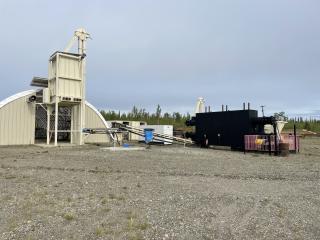Alaska wood innovations program generates local energy

ALASKA—Grants for wood innovation projects are generating local, sustainable, lower cost energy for remote areas in Alaska. This funding invests in local, scalable solutions that bolster the independence and ingenuity that enable Alaskans to thrive.
Since 2013, Alaska’s State, Private, and Tribal Forestry’s Wood Innovations Program has invested $9.1 million in local communities, allocated through 38 grants for wood energy, firewood, product infrastructure and more. Two 2023 projects are sustainably leading the way with local wood products.
In Tok, Tok Wood Fuels, LLC is turning wood residue from a local mill into high-density logs for use in wood stoves and boilers. They have four times the heat output of regular wood and burn cleaner, producing less smoke and other pollutants. Another benefit: hazardous fuels reduction. Tok Wood Fuels partners with the Native Village of Tetlin to conduct targeted wood harvesting, which helps reduce the risk of wildfire.
Down the road, the Alaska Gateway School District has other biomass projects underway. At the Northway School, a new woodchip heating system is under construction. Meanwhile, an existing wood heating system is being revitalized for the Mentasta School and surrounding community. Combined, these biomass systems will replace 33,800 gallons of fuel oil annually. This saves about $155,000 per year in energy expenses in a school district of around 400 students, allowing significant funds to be reinvested in education programs.
Plant-derived fuels like wood are locally abundant in many parts of Alaska. Using woodchips increases energy independence and supports the local economy by growing jobs and keeping dollars within the community. It also reduces heat-trapping carbon dioxide emissions associated with transporting heating fuel oil to remote interior Alaska.
The projects in Tok fulfill three of the six adaptation actions prioritized in the Climate Action Plan:
Adapt to Changing Fire Regimes—through hazardous fuels reduction.
Support the Delivery of Ecosystem Products & Services in a Changing Climate—from local production of fuel logs and heat.
Deliver Environmental Justice through Adaptation Actions—by partnering with the underserved communities of Tetlin, Northway and Mentasta.
Climate change is considered the biggest challenge of our time; deploying localized solutions to communities across the state and nation is just one way to effectively mitigate and adapt to it.
